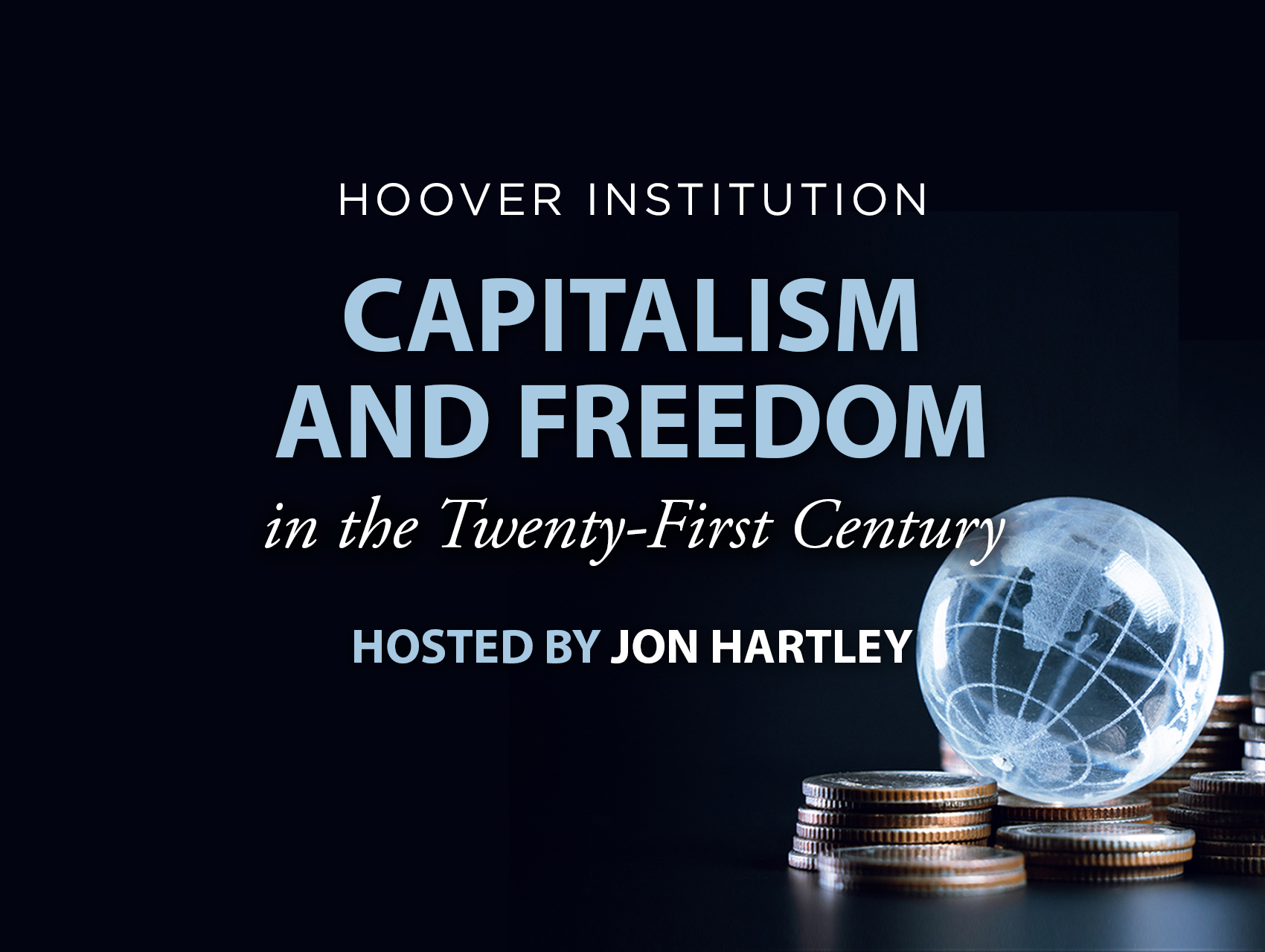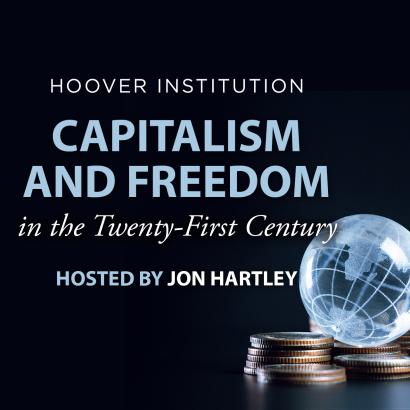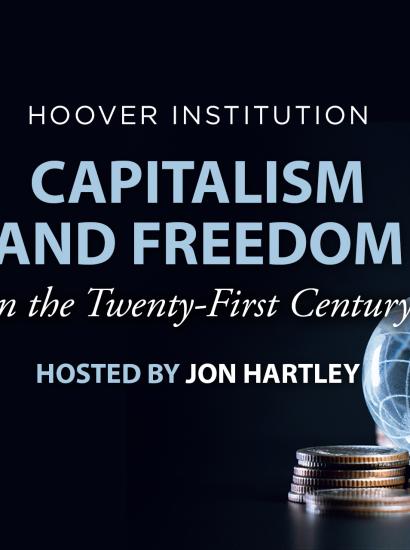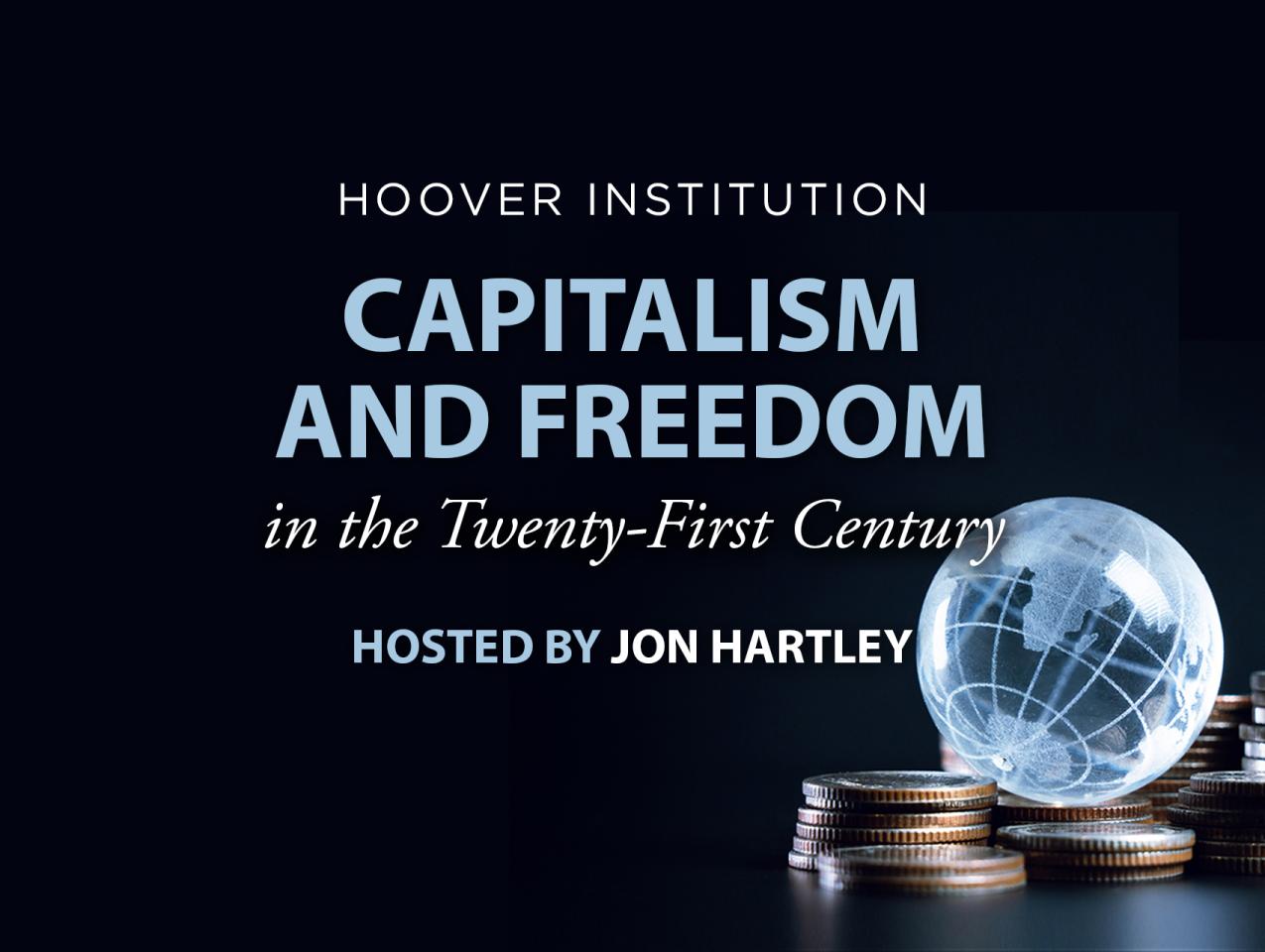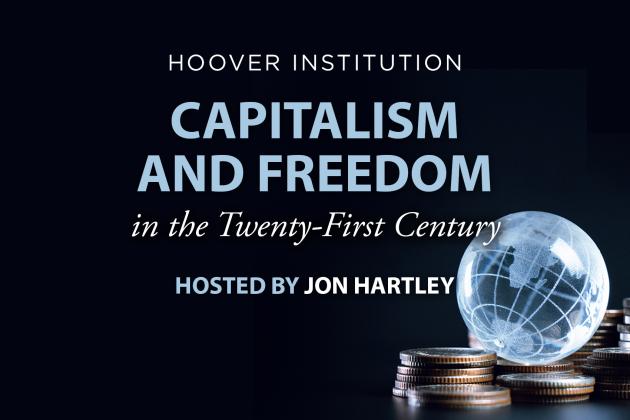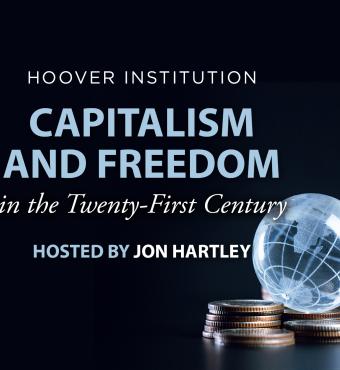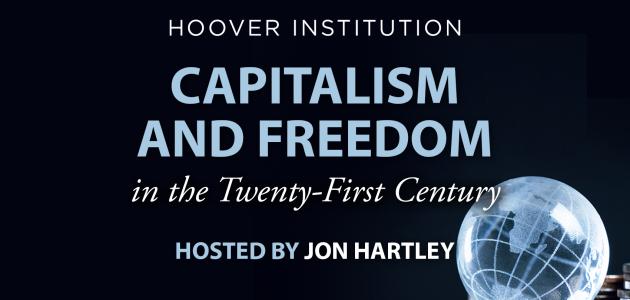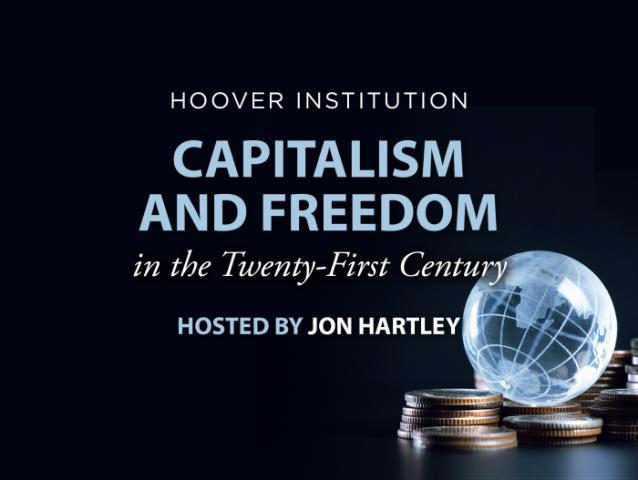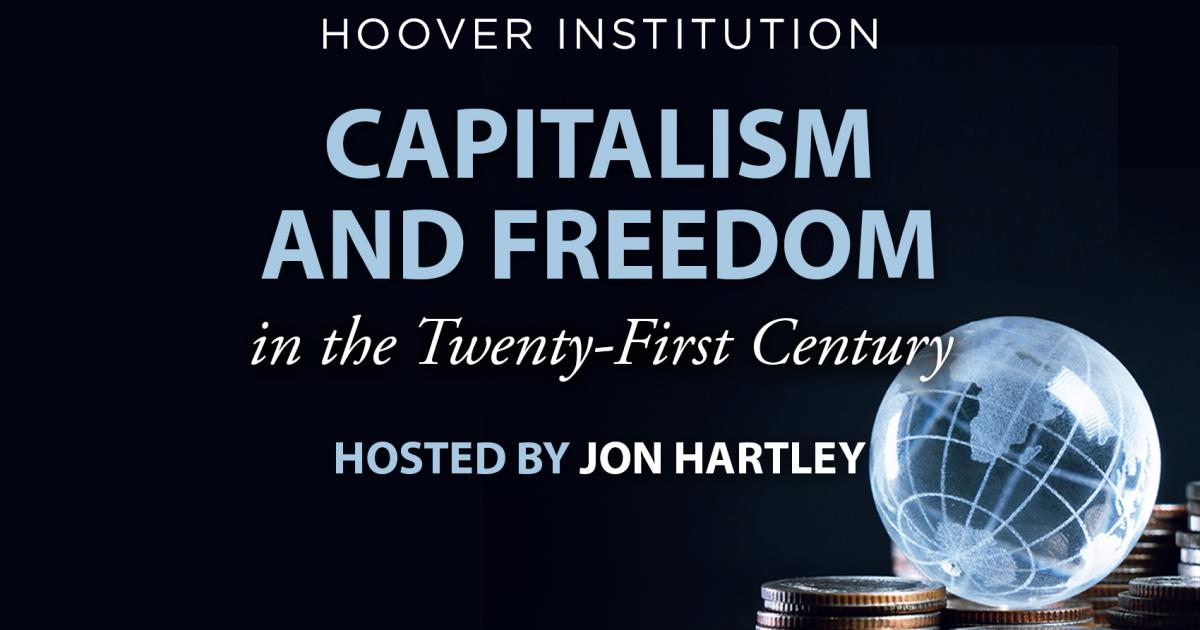Josh Rauh (Stanford GSB Finance Professor and Hoover Senior Fellow) joins the podcast to discuss his distinguished academic career, his research in public economics on taxes and public pensions, his time at the Trump Administration White House Council of Economic Advisors, the legacy of the CARES Act together with other COVID-19 era spending, and the future path of U.S. public debt.
Learn more about your ad choices. Visit megaphone.fm/adchoices
>> Commercial: Its that time of the year. Your vacation is coming up. You can already hear the beach waves, feel the warm breeze. Relax and think about work. You really, really want it all to work out while youre away. Monday.com gives you and the team that peace of mind.
When all work is on one platform and everyones in sync, things just flow wherever you are. Tap a banner to go to Monday.com.
>> John Hurley: This is the capitalism and freedmen, the 21st century podcast where we talk about economics, markets and public policy. I'm John Hurley, your host. Today I'm joined by Josh Rao, who's the Ormond family professor of finance at the Stanford Graduate School of Business.
He's a senior fellow at the Hoover Institution. He's also the co founder of the Global Liberty Institute and the new Liberty Land Substac. Josh studies public economics, namely taxation, pensions, and many more essential topics, and has established himself as a leading expert in the field. Welcome.
>> Josh Rao: Thank you, John, thanks for having me.
>> John Hurley: Josh, I wanna get into your background. How did you first get interested in economics and where'd you grow up?
>> Josh Rao: Well, it's a great question. I grew up in the Boston area. I went to a small private school in the Boston area called the Roxbury Latin School, a classically oriented school where students still learned and still learn Latin and ancient Greek.
And I went to Yale. I initially started out as a natural sciences person, starting out maybe being premed or interested in molecular biology. But I took a freshman organic chemistry class that hit me like a ton of bricks and ended up exploring the social sciences because I was good at math.
And also my fundamental kind of issue with the natural sciences was I just really didn't like working in a lab. I just was not really a lab person.
>> John Hurley: Were you a numbers person?
>> Josh Rao: I was a numbers person and a data person, but not a lab person.
And so when I took my first economics course, it was a revelation because I realized that mathematics and data science could be applied to topics that were important and current and that had public policy influence.
>> John Hurley: Fantastic, and you worked at Goldman Sachs for a period of time before you did your PhD in economics at MIT.
You studied public economics and were a Jim Perturba student who's advised many of today's leading public economists, I think Emmanuel Sayes, Sebi Sancheva and yourself. I'm curious, what was it like at MIT in the early 2000s?
>> Josh Rao: Yeah, well, just backing up a little bit. Coming out of Yale, I wasn't really very organized about what it is that I wanted to do.
I had the solid grades in the economics and math classes, but I was not particularly focused. And I don't think I would ever have gotten into a PhD program today, because of course, today you need not only the undergraduate background. But a couple years of having been an RA for some professor, a set of glowing recommendations from very famous people.
And I also, coming out of Yale, wasn't really sure that I wanted to get a PhD in economics. I was intrigued by some of the more practical applications of economics. But also wasn't organized enough or focused enough to go on the investment banking market that a lot of my kind of people in my cohort from Yale were doing.
So I ended up, actually lived in Germany for a year and I did a couple internships that I just put together myself. One of which was with the German parliament, a political party in the German parliament called the FTP, which is sort of a libertarian party. And I was intrigued by the idea that there could be such a party because, of course, in America we have a libertarian party, but it's not really a force.
The FTP in Germany has traditionally, historically been sort of a kingmaker for some of the other bigger parties. Things have changed a bit now.
>> John Hurley: Like the CDU or the SPD.
>> Josh Rao: Exactly. CDU or SPD would sort of go back and forth during the 20th century between the control government having being under the control of one of those two bigger parties, depending on who the FTP was aligned with.
And so that was a really fascinating experience. And I ended up in an internship at Deutsche bank in Frankfurt and working on some macroeconomic strategy stuff at Deutsche. So that all happened over the course of a year. And then I ended up at Goldman Sachs in London and their economics research team.
And that was a terrific experience. I was there in London for two and a half years with those folks, some really excellent PhD economists who were there applying their skills to really market oriented questions. A lot of what we were doing and a lot of what those groups still do involves macroeconomic forecasting and the interpretation of macroeconomic data for the firm's traders, currency traders and bond traders.
This is like Jan Hattius's economics research, US economics, global economics research.
>> John Hurley: And maybe at the time, I think Jim O'Neill in London was perhaps running some of this at the time.
>> Josh Rao: Exactly, and Jan was a young economist as well, like me there. He was in the Frankfurt office, so I knew him back then.
Of course, he's stayed with the firm and really.
>> John Hurley: He's German.
>> Josh Rao: He's German, yeah, he moved from Frankfurt to the US sometime around 2000. Around the time that I left Goldman he's really done amazing things at the firm.
>> John Hurley: And you're fluent in German.
>> Josh Rao: I am fluent in German, that is correct.
>> John Hurley: Now, were you fluent in German before you went over to Germany or was that something you just picked up while you were there?
>> Josh Rao: Learned it in college, was very interested in the politics and economics of the EU and just kind of picked it up while I was over there.
>> John Hurley: Wow.
>> Josh Rao: Yeah, so Goldman in London going to that time period, I was there in the late 1990s. It was the dotcom boom days and there were a lot of really very, very good people working there. After a couple years, I got the feeling that the market prediction game wasn't really for me.
Actually, people were under tremendous pressure there to make predictions in markets on a pretty short time horizon. And people were punished if they were wrong. I mean, there was a currency crisis in Asia in mid 1998 that happened right after I joined. And the first thing that happened was about half of the people who I had said hello to during the first couple months that I was there were immediately fired for not having predicted the Asian currency crisis.
That gave me a bit of a sense of what working there could potentially be like if you got stuff wrong. And so after a couple of years, I decided that I wanted to go back and get a PhD in economics and deepen my knowledge and contribute to research.
And take some more time to do the more deep, longer form research that we do when we write papers in economics.
>> John Hurley: Wow, well, fascinating. Forecasting is very difficult. And you have this whole recent inflationary episode in the early 2020s and the inability to forecast that on the part of professional forecasters.
If that's any indication, I think you chose perhaps a field that might be somewhat less impossible. You're a very distinguished public economist. You study a number of things from taxes to pensions. Can you explain what your research agenda is and its main ideas?
>> Josh Rao: Yeah well, let me tell you a little about how I got into it.
I was always interested, even from the Goldman Sachs days, in financial markets as a vehicle for long term investments. And finance being about the ability of individuals to move resources and consumption across time and across different states of the world at different prices depending on what the conditions of financial markets were.
So that was one set of issues I was very interested in also public policy issues like inequality, the measurement inequality and taxation, the optimal size of government, what's the right marginal tax rate that should be set? Those types of public health questions. So I went to MIT intending to work with Jim Ptrba, who I eventually did become my advisor.
But not before a bit of a bumpy start, I think in the spirit of posting your losses, I'll tell you a little bit about the beginnings of my, my time at MIT. First of all, I was admitted, but not with funding, and I failed to get an NSF fellowship.
But I went to the admitted students day and talked to Jim Paterba and other professors and was very impressed and looking forward to working there and to being a student there. But the director of graduate studies, when it came to the meeting that I had with him, he said, look, I'm sorry to tell you, but, you know, we took too many people this year.
And he basically said, mistakes were made. And he didn't say you were one of them directly, but that was kind of the implication that I was getting. And he actually said, please don't come here because we have no money for you. And not only we're not giving you money this year, we're not gonna give you money ever.
So this is tough medicine to take. And I thought about it, and because I had been working at Goldman, I didn't make a huge amount of money at Goldman. I was still lower level person, but I had some savings. And I actually said, you know what, screw it.
Relative to my next best option, getting a PhD in economics at MIT is what I want to do, and I'm not gonna let myself be discouraged by this. So I had to fork over tuition when a lot of other, well, all my other classmates basically had their tuition paid for.
And to make things even worse, after I had accepted, I came to learn that actually Jim Perturba, he decided after that that he was gonna take a year's leave and go be at the Hoover institution. Actually a place that I've spent a lot of time at in the last, most recent decade of my career.
And so things were looking pretty rough at that time for me. And I guess in the spirit of stick with your plan, don't get knocked off your plan, I can say that it was good that I didn't, because what ended up happening was first year in a PhD program.
As you know, John, you're bumping around a little bit. It can be hard to get your footing exactly. And you're gonna try out some stuff. I worked for a few different people, different professors, and did a few different things. I had to do ra work to actually pay the bills, and I think I got my footing.
And then Jim came back and I started working with him on the topics that actually come to MIT to work on.
>> John Hurley: Well, that's incredibly impressive. It's amazing to me that the best economics department in the world, it doesn't provide full funding for its students or has this expectation that many get nsfs.
That sort of always been an interesting phenomenon to me. But the fact that you were able to persevere through that is really amazing. And also totally something I think, worth fighting for to be at MIT in the early two thousands, just sort of at the beginning of this wave of causal inference, credibility, revolution.
What a great time to be in Cambridge at MIT, or Harvard for that matter.
>> Josh Rao: Well, that's exactly right. I mean, I think what I got from being at MIT was, first of all, Jim Paterba is just a tremendously impressive advisor, wonderful advisor who invests a lot of time and energy in really growing his PhD students.
We're having a celebration of him next year. Not that he's retiring, but there's just tradition developing now that when someone's in their mid 60s. You just kind of get a bunch of people together, a bunch of students together to celebrate the person at a time when they're still really at their prime and doing great things.
And that's gonna be in March 2024, I'm looking forward to going and celebrating him. So he was a huge influence and was just a tremendous mentor for me. But also at the same time being exposed to the ideas of Josh Angrist and John Gruber and other people who are applying the techniques of identification to address causality and economics.
So it was an exciting time to be there. I was known at the time by my classmates as MIT Econ's only Republican. I didn't necessarily totally embrace that, to be honest. I think I thought of myself more as sort of a swing voter, and especially because I focused kind of on economics.
Coming out of the Clinton administration, things didn't look that bad. I mean, there was a surplus, at least on the books the way that they measure it. There have been some welfare reform, and George W Bush had the hallmarks of being and ultimately became a sort of, I guess we think of as being kind of a big spending Republican with not only the foreign policy.
Things which you can debate their necessity, but also Medicare part D, their big government expansion. So I wasn't even sure what exactly that meant. MIT is only Republicans, but MIT is only Republican. But maybe even my classmates saw something that I didn't know. Over time, I've come to embrace that.
>> John Hurley: Wonderful. I mean, it's so fascinating. You have to think how much, certainly the policy and political stands have changed since then, just over more than 20 years, and how the field has changed over that period of time. So I wanna get into your research agenda. So you spend since then, it's been almost, I think 20 years since you graduated in 2004.
What do you think have been your most impactful research accomplishments thus far?
>> Josh Rao: Thanks, well, a few things. So I think the area that I kind of got known for in the field of financial economics is this topic of pensions, of government liabilities and pensions in particular. And it's interesting, it was an area that's always interesting to me because it's a topic where all of public policy seemed to be making some fundamental basic mistakes in their applications of the principles of finance.
And it was an issue that brought together financial markets and government budgeting. The big challenge, I think that goes on in this area is that state and local governments, they always have an incentive to sort of delay costs in ways that future politicians will have to bear. And there is no easier way to do that and actually no more widely accepted way of doing it.
Than telling your employees instead of paying you in current compensation as much as you otherwise would get, I'm gonna pay you in pensions. I'm gonna promise you a pension, really nice pension years down the line. You got to stay here for 20 or 25 or 30 years if you want to get it, if you want it to be any good.
And what was fascinating to me is in grad school, my fields were public economics and corporate finance. And I think just seeing the tension between those two things, the way that we know from financial economics, the way that liability is supposed to be measured and the way that we model the evolution of assets.
As looking across states of the world and over time. And then looking at the way that the government budgeting was done, which is a way that government budgeting essentially just treats these forecasts of financial markets. Let's say the stock market's gonna crank out a return of 10% a year as being a sure thing.
They don't adjust that for risk at all. And so what you end up having is situations where state and local governments are basically doing budgeting on completely flawed assumptions. So I think some of the empirical work I got known for was remeasuring state and local government liabilities using the principles of finance, and applying the principles of finance to state and local government budgeting on that topic.
And sort of, by extension, on other things, like the retiree healthcare that they offer, and trying to move the conception of public budgeting more in a direction that aligns with the way that we think about it in finance. So that was kind of one of the big things.
>> John Hurley: And does that include, unfunded pension liabilities, which are sort of an increasing issue in certainly our fiscal policy discussions, cuz that includes entitlements? We'll talk a little bit more about the US federal debt situation later. But in your research, that's encompassing that?
>> Josh Rao: Yeah, right. I mean, that was motivated initially by how, say, a city like the city of Chicago budgets for the pensions that it promises to public safety officials or to teachers.
And those are, when we say the words unfunded pension liabilities. Which another great mentor of mine, Professor Ed Glaser, said that his wife told him those were the least sexy three words in the English language, unfunded pension liabilities. But nonetheless, to me, I find it a very fascinating topic of study, and indeed, it's that.
And then you can also extend these types of considerations to other government programs, like social security.
>> John Hurley: Perhaps increasingly, the three most important words in fiscal and debt policy.
>> Josh Rao: Yes, I like it, yeah. The three most important words, who cares if they're sexy? The point is they're important.
>> John Hurley: Exactly, now, you spent about 15 years as a distinguished professor, and then you decided that you wanted to serve in government. You joined the Trump administration Council of Economic Advisors in the autumn of 2019, soon before the Covid-19 pandemic hit the US. Tell us about what that experience was like.
>> Josh Rao: Well, when I was called by acting CEA chair Tom Phillipson in fall 2019 to join the CEA, it was a great honor for me, something I had always wanted to do, and it was a time in my life where it was possible for me to go do it.
And it was something that I didn't say no to. And I actually would advise anybody who gets called on for government service to try to do it and make it happen. I also would advise them to do something that I did, which was to set down for myself in advance the limits of what I would be willing to tolerate as being part of that position.
And this was inspired to me by someone who was a mentor of my mentors, a man named Martin Feldstein, a great professor of economics at Harvard University, who had quit the Reagan administration. He was the chair of the CEA. He quit the Reagan administration over the issue of budget deficits.
And over the fact that Congress was proposing, was passing a budget that would have, at the time, had a $100 billion deficit, which is, of course, nothing compared to where we are today.
>> John Hurley: Martin Feldstein was one of the famously, I think, one of the few deficit hawks in the Reagan administration.
>> Josh Rao: Exactly, exactly. And so when I went to the Trump administration, I was worried about what had been going on with the deficit, because it wasn't good. And especially in a situation where, at least for the first part of that administration, you had both the presidency and both houses of Congress controlled by the Republicans.
Well, I liked the Tax Cut and Jobs Act and some of the improved incentives in that act. I was not happy.
>> John Hurley: Which brought down the corporate tax rate to 21% and changed up the expensing rules. And I guess it was very much a pro-growth kind of tax reform.
Didn't do too much on the personal side of things. A number of those things are coming up in 2025. Certainly, a big tax discussion is brewing. But you came in after that.
>> Josh Rao: Came in after that, right, right. And first few months were good. We were working on, during that cycle of the end of the year and the beginning of the next year, you're basically working on the economic rapport of the president.
And you are preparing the president for any economics that are gonna go into the State of the Union address. And we did a number of things, including taking stock of where the US was on inequality, on income growth at different parts of the income distribution, which is a big topic.
Another topic I could talk about all day, because I think that fundamentally, the narrative in the press about inequality is based on some research by some other economists out there that I think is wrong. This is the narrative of Emmanuel Sieyes and Thoma Piketty. And I think that the other economists have worked on it like Autin and Splinter and others have basically figured out that there are some real statistical problems with the Piketty Sieyes.
>> John Hurley: They're at the Joint Committee on Taxation, or one of the-
>> Josh Rao: One's at JCT, the other is the treasury, exactly. So some of that made its way into the state of the union address. So that was kind of neat. And we're also doing a lot of. A lot of what you do when you're at CEA is trying to make sure that when sort of bad ideas bubble up from various parts of the government.
That you're shedding some solid economic light on what those ideas might actually entail or do. And so there were a lot of little things like that. But things really changed when Covid happened. And I think the policy response to Covid, of course, really divided the country in some ways, really divided the world.
And initially, I think President Trump's instincts were not to overreact, to make sure not to overreact initially. And this was also the case with UK Prime Minister Boris Johnson, also initially were saying, we're not gonna overreact on lockdowns. We're not gonna change, try to change our entire society or economic structure here just to combat COVID.
But things turned pretty quickly in terms of who the president was listening to on health policy. He was obviously listening strongly to Fauci and Birx. And on economic policy when this crisis happened, suddenly, my feeling was that the economists within the administration, at least the ones who I knew, weren't really being consulted about the economic policy response.
And economic policy response In March 2020, if we sort of rewind and think back to the history of this and what was going on then was the run up to what was called the CARES Act. CARES act, at the end of March 2020, introduced some of these really big new government programs, stimulus checks for people, big business bailouts, including targeted bailouts to airlines.
Small business bailouts with the PPP, the Paycheck Protection Program, which was a program that turned out to be rife with fraud. Flat dollar bonuses for unemployment insurance. Unemployment insurance is a program, it's already a stabilizer. By doing additional legislation on top of it, it expanded in such a way that made it so that nobody would have an incentive to work for a very long time.
One of the aspects of it was these flat $600 bonus amounts. That made for a lot of people the replacement rate of UI for their job, 150% or more. I mean, there are bunch of studies that showed this, and it was immediately apparent. Plus hundreds of billions of dollars to state and local governments that ultimately they did not need.
Now, I could be nice and say, well, there was a lot of uncertainty, we didn't know, but this was a program of government expansion that I just did not want to be part of. And in particular, I also, as I said, I think if I felt that, not necessarily me, but that other economists at the CEA or in the administration generally were making that point.
Or were around to make that point, that would have been one thing. But as it was, I didnt feel that point was getting made. And I, to this day, very much strongly disagree with that policy response. And so even though this was about five months into my time there, when I resigned, and I planned to stay for at least a year.
I had arranged a year's leave from Stanford and hoped maybe to stay for longer. I ended up returning, coming back to Stanford because they basically crossed the limit that I had set for myself going into it.
>> John Hurley: Fascinating and certainly commendable to sort of see this coming into standby, your own principles and ideas.
I'm curious just to take stock on the legacy of the CARES Act. It's fascinating to think, over three years later, where we are now. We had the CARES Act, stimulus checks, PPP grants, it had massive unemployment insurance. There were expansions and so forth and subsequent bills. And then we had the additional Trump bill, I think, in the end of 2020, I believe.
And then we had the Biden ARP. We had, more recently, the so-called Inflation Reduction Act. I think there's been, over that period of time, an increase in the debt to GDP on the order of 20% just from those sets of initiatives alone. First and foremost, one, do you think that the inflation that we're seeing today, that started to uptick in 2021.
That has peaked at around 8% headline and a little bit less than that on the core side. Do you think that that uptick in inflation is related to that increase in government spending?
>> Josh Rao: I think, absolutely, it's related to that increase in government spending. And I mean, some people who I respect and have worked with draw a line between the spending that happened in 2020 and the spending that happened in 2021.
And they say, well, in 2020, it was necessary, we had to do this. But then ARPA 2021, that was unadvised. I don't agree with that at all. I think that the lockdowns of Covid and the spending increases were really kinda two sides of the same coin. And in fact, I would go so far as to say that all of that spending was a way for the government to essentially tranquilize the American people into accepting these destructive lockdowns.
A lot of people say, well, this isn't so bad. I'm still getting my stimulus check, and I'm getting my PPP loan, I'm getting my UI, and accepting something that ultimately, I think, is gonna be extremely destructive. Not only because of the new baseline that it sort of reset on the economic spending side.
But also, of course, what we've done to our younger people, who we essentially locked in their homes for a year and a half and thought, this will be fine. At least in some states, we did that. And of course, it's not at all fine. And so in terms of inflation, I think some of the evidence of this is that savings rates spiked up to over 30% during this time.
By definition, that almost means you're sending out money, the federal government sending out money that people didn't need. Why do you have to boost people's savings rates to that level? And of course, then when all that money came flooding back into the economy on the demand side, the supply side, particularly labor supply, was still very, very limited.
So I absolutely, I trace a pretty continuous line. I'll agree that ARPA and the March 2021 legislation was perhaps the least necessary of all of it. But I also blame the people in charge during 2020 in both Congress and the administration for going in that direction. You point out debt to GDP.
I mean, another figure that I just think is worth bearing in mind is just what is government spending to GDP? I like to ask my students before telling them anything or giving them any readings, what do you think the ratio of government spending is to GDP in this country?
And I explain what that means, for every dollar of spending in the US economy, what percentage of that is spent by the government? And during 2020, in the United States of America, which people usually think of as this bastion of free market capitalism, that number went up to 48%.
And it subsided back a little bit to around 44% the following year. And I think it settled into about 42% this year. But this is the United States of America. Do people feel that they are getting the government the services, the quality of services that amount of money would buy, should buy?
And by the way, this is federal, state, and local combined, the numbers that I'm giving you here. I think the inflation is one of the symptoms of what it is that we've done. But I really think that we need to step back and ask, is this the appropriate size of government?
>> John Hurley: Let's rewind it to March 2020. You are secretary of the Treasury, and let's go piece by piece here. How the response with obviously the benefit of hindsight could have been a better one. And obviously, at the time, it wasn't totally known how bad the pandemic was, how lethal it was, and so forth.
And that was something that was sort of learned over time. But looking back with 2020 hindsight, I think it's fair to say that the lockdowns certainly didn't really prevent transmission and perhaps cause further economic losses. I'm curious, in terms of fiscal policy response, we don't need to get too much into the Fed policy response in the lender last resort stuff.
But on the fiscal policy side of things, obviously, there was a lot of QE as well. And this was in part a joint effort on the fiscal policy side things. Okay, so we think unemployment insurance fair to say that maybe we should have done a percentage of wage replacement instead of $400 a week.
That doesn't play with the marginal tax rate. It creates the kind of distortions that having over 100% marginal tax rates can create. But I'm curious, how would you rethink something like the stimulus checks or something like that? The PPP, there was so much government infrastructure that was sort of used.
They were using the small business Administration to work with the banking system and a lot of smaller banks. And there was certainly a lot of uproar when certain businesses, hedge funds, were taking out PPP grants. I mean, they weren't loans given as a loan, but it was pretty different and turned into a grant.
And it was basically just money to largely small businesses. But there's been a lot of controversy about certainly how much waste, how much fraud was there. And I'm curious like do you think that maybe the seamless checks alone would have been enough? What should we have done for small businesses?
And going forward, say we have a pandemic in the future, how do you think we should handle such a fiscal policy response, that kind of recession?
>> Josh Rao: Well, let's take each of these insurance. So first of all, on the unemployment insurance, any expansion of the unemployment insurance program, whether it would be with a flat dollar amount which creates really perverse incentives.
Or more preferably with some kind of percentage of wage bonus on top, if that was even necessary, because again, the UI program is already in place. It's not clear there was a need to expand UI. But if there was gonna be an expansion of UI, the point that I always make is this is an opportunity also to try to fix UI for the long term future.
The unemployment insurance system, I don't wanna get too much into details, but every state is supposed to keep, maintain a balance at the treasury that's sort of like a precautionary balance. It's supposed to be sort of the equivalent of three really bad years. They're supposed to have that in precautionary holdings at the treasury.
And about half of the states comply and the other half don't comply. And there's no teeth to it, there's no punishment for not complying. And what ends up happening is, and this is going on now, is that, well, California and other states that were not complying, they had to take big loans from the federal government.
To pay the UI during COVID. And now they're supposed to be paying those loans back, but they don't have the money to pay them back cuz now there's a deficit. And so they're passing those costs on to businesses in the higher state UI taxes. Okay, that was a bit of a detour, but the point is that the entire UI system had a very flawed architecture.
And so the way to get a compromise in place is to say, yeah, all right, maybe we need to expand UI a little bit for this crisis, but let's also fix the future. To say that if states wanna have generous UI, they actually have to have those precautionary savings on hand.
They actually have to have a fiscally sound system. So the general philosophy is if you're gonna do an expansion today for a crisis, let's make sure we do something to sort of fix the future. And so that's what I wish would happen with that and with a lot of government programs and other things and other sort of bailout type things.
Any system where you're gonna pump in money, you should be thinking, okay, in exchange for this, what kind of reform are we gonna ask for the long term. For something like the big business bailouts, I mean, bailing out airlines was something that was just, I guess it was ended up costing about 25 billion, which I don't know.
I suppose now we're supposed to think that's small, I didn't think it's small. But you've flown on any of the three major airlines in the last couple decades. I mean, you've flown on an airline that was in chapter 11 bankruptcy. We have structures in place. So that when companies can't pay all their debts, that the creditors who bought bonds in the company end up, they take over ownership from the stockholders, stockholders get wiped out.
And so one of the things I think also about the policy response that really bothered me is that it bailed out shareholders, equity holders. Most of whom voluntarily, all of them voluntarily took risk to buy equities in these companies, buy stock in these companies. The idea being that if the company had a bad realization, they get wiped out and then the creditors get to take over the company.
And by stepping in and removing that entire mechanism, we took the entire system of shareholder capitalism and risk based capitalism and we said, we're not gonna let anybody lose a dollar. The irony of all of this is that shareholders, equity holders came out of COVID doing great. Look at what the stock market did in the year from there was a dip in 2020.
People started getting scared, roaring back quickly and then way surpassed its initial level. So I think making use, I think my general principle is, number one, make use of existing structures and programs that we know work. And if you have to, some colleagues of mine at the GSB and I, after I came back, proposed something that we thought would be more useful than a lot of the other facilities.
And programs that are being proposed, which is a sort of support for debtor and possession financing, which is the kind of bridge finance you need to have a bankruptcy process. A financial restructuring process that would have kept airlines and other companies operating. But that would have not just bailed out shareholders and that would have let the normal course of financial markets do their job.
I'll give you one other example, is also the money that was directed unconditionally to state and local governments. CARES Act, I think 500 billion to state and local governments. And there were some attempts to try to place restrictions on what they could do with that money.
>> John Hurley: More recently also been the bailouts and public sector unions.
>> Josh Rao: Yeah, union pension plan is also a big thing with the state and local governments. State, local governments, they borrow from the public, they issue municipal bonds, that's a $4 trillion market. Municipal bonds are mostly owned by households, actually by high income households, and they have historically had higher yields than, say, treasury bonds.
So better savings vehicles for households, because those households, you're taking on some risk. You're taking on some risk that the city might run into financial trouble or the state might run into financial trouble, you get a tax break that tends to lower the yield relative to other types of debt.
But because of that default risk and maybe some liquidity, there may be a little less liquid in treasury bonds, they end up getting higher yields. Why was it that no municipal bondholder lost a single centennial during this episode, but the taxpayers came in and just bailed out? Every state and local government just threw money at these municipal bonds, these are owned by, again, largely high income households.
It's not like something that has a huge amount of systemic risk. So I wrote an op Ed during 2020 where I said, if there's gonna be any more, I mean, I wish they had done this initially, but any more bailout funding state or local governments. They should have to haircut their municipal bonds outstanding, meaning that if an investor owned a municipal bond and that bond was worth $1,000.
Maybe they have to haircut that thing down to say, okay, now that's only gonna be worth 900. You took risk, and you're gonna have to bear the downside, some of the downside, when that downside happens. That's what in the European Union, when Greece was defaulted on its debt, European commission negotiated a bailout package for Greece.
Bondholders had to take some kind of loss on that. They weren't bailed out 100% in their entirety, they weren't sent all the way to zero. But to me, a lot of these things really just violated the principles of capitalism that I feel that our country and our economy are built on.
And so as we think about what's the right way to deal with crises, sure, if you feel that there are some vulnerable parts of the economy that need support, go do it. But use this use crisis as an opportunity to reform systems like the UI system that was broken to begin with.
And secondly, don't do bailouts when you don't need to do bailouts, why should taxpayers have to always support big corporations, it just makes no sense to me.
>> John Hurley: Absolutely, and certainly some of that, I think violates Basher House dictum, which is having some penalty in these sorts of emergency lending or bailout type events.
I'm curious, do you have any thoughts on just the Biden administration? House Republicans, they just came to an agreement on the debt ceiling, suspending it until January 1, 2025, exchange for about $1.5 trillion in reduced spending according to CBO. Any thoughts on the long term prospects for the us debt and government spending?
>> Josh Rao: Yeah, so this deal recently has gotten some criticism from some of the more fiscally conservative corners of the Republicans in Congress for not somehow not doing enough. For not going far enough, that Speaker McCarthy, didn't get enough concessions, enough spending cuts in exchange for the authorization of raising the debt ceiling.
And while I understand where that is coming from, because if we're saving, and CBO's estimate we're going to save 1.5 trillion over the next ten years, that's nice. But that's pretty small as a percentage of total debt or the total deficits that we expect to have over the next ten years.
So I understand where it's coming from politically I don't think that we could have expected much more. And the reason I say that is that the Democrats have the Senate, Democrats have the presidency, and the Republicans have a razor thin margin in the House. And what really has to happen if the long run picture for the US fiscal situation is gonna improve is that there has to be a party in power where there is agreement among the different branches of government.
So alignment of the parties, I'm thinking it's probably gonna be the Republican Party, but maybe there'll be a new party, I don't know. And where voters have been convinced that they need to actually vote for the party that's gonna be fiscally responsible and try to fix the debt and deficit mess.
I just think when you have such a razor thin margin of people, the mandate is just not strongly enough there. I wish it were, if I were a benevolent dictator, I would say we need to do this for the future, we need to put the future on a solid footing.
But the votes just otherwise weren't there and so I think probably we did as well as we could have.
>> John Hurley: Yeah, I mean, it's such a strange thing, I think that that ceiling. It's this weird thing where the US possibility of default being sort of part of the negotiation, obviously not ideal, I mean, creates all this excess volatility in financial markets.
But I mean, on the flip side, it's like the one tool as bad as it is, that actually seems to bring about some conversations about government spending and debt. I remember back over ten years ago in 2011 when there was the debt ceiling standoff then and the S&P downgrading US debt.
And that caused big sell off and risk markets, ironically, it actually caused treasuries to rally. But also that series of events created the Bowl Simpsons Commission, which seemed to be simulating some public dialogue about fiscal policy and budget reform, but didn't seem to really go anywhere. Looking 12 years later, in fact, things maybe have gotten worse in recent years.
I just finish on talking to you about these new endeavors that you have started. You recently have founded the Global Liberty Institute and your Substack Liberty lens, what are they about?
>> Josh Rao: We started this, so the Global Liberty Institute is a joint effort between myself and Scott Atlas.
Someone who's well known from his work during 2020 and during COVID to try to shed some actual rational light on the health policy responses. And we started this organization, I think for two purposes, first is that it's an international organization, sort of in the spirit of the World Economic Forum and the World Economic Forum.
And a lot of the other international organizations have been doing, pushing really, really hard on the research front on a lot of what I think of as being sort of rationales for big government. Combined with sort of a cooperation between corporations and government, which is just gonna kind of feed even bigger government.
Some of these topics are things like addressing inequality, we were talking about this before. If you listen to these international organizations, you would think that we're having this explosion in inequality that requires some kind of new massive redistribution of money. But when you look at the actual statistics that a lot of this stuff is based on, a lot of their claims are based on, they're very, very flimsy, they don't actually hold up.
And really, these organizations are feeding the public a line and a narrative that makes them wanna believe that we need all this additional redistribution. And so one of the sets of things we're trying to do is just have an organization that brings together researchers across different countries to try to put some of the stuff in a more rational lens, things like inequality or climate.
What's the rational response to climate change? The idea that we're gonna go to net zero and that it's gonna cost over $100 trillion to do that. This is something that's being pushed very, very hard by a sort of cooperation between large companies that are gonna profit from it and governments that enjoy increasing their power.
And I think the evidence of that is that one of the last COP meetings and the COP meeting in Glasgow, Scotland.
>> John Hurley: That's the big environmental.
>> Josh Rao: Big environmental conference, conference, right. The financial institutions, the banks were lining up to provide this $130 trillion of financing. Well, of course they were, I mean, if you tell everybody, hey, okay, we need to destroy all of this capital that we have, this dirty energy producing capital, need to replace it with this green capital.
And we're gonna have to finance it somehow. So the companies that are gonna build that new stuff, they're gonna have to borrow or raise $130 trillion, well, who benefits and who loses from that? I mean, clearly, the financiers who are gonna get to be the intermediaries and loan the money or provide the equity capital, they're huge beneficiaries of that, I like to compare that to the broken window fallacy.
The broken window fallacy of Bastiat. Which is this idea that there's this fallacy that, hey, maybe we should go around breaking windows and then hiring repair people to repair them because we could generate all this economic activity. Well, the person who would benefit from that would be the glass repair man, and in this case, the entities are gonna benefit from it are the companies are gonna build all this new green energy and the financiers are gonna finance it.
So I'm getting a little off topic, but you asked about GLI, so GLI is trying to be a voice of reason on those times. Second role of GLI is that organizations like the World Economic Forum have done really well at organizing young people on their economic policy objectives, and young people who then end up going into public policy.
So the chairman of the World Economic Forum, Klaus Schwab, is fond of actually boasting that graduates of his program include people like Justin Trudeau. I mean, he's proud of that fact, but I don't think necessarily he should be proud of it, but he is. And the government of Argentina, which is an economic basket case, what you have to hand them, though, is that they have been incredibly effective at mentoring these people.
And so what we are doing with the Global Liberty Institute, and I know you were able to attend our first rising leaders summit-
>> John Hurley: Which was fantastic.
>> Josh Rao: In Palm Beach in February, is to try to do a better job of organizing and mentoring rising policy leaders who are gonna be facing the economic problems of the day.
The critical and pressing and really dramatic economic problems of the day, using the rational principles of economics. And I hope that we're gonna be able to do that.
>> John Hurley: Fantastic, and your new Liberty Lens Substack?
>> Josh Rao: Yeah, so the Liberty Lens Substack is an attempt to write some pieces, get some pieces out there in a sort of short-to-medium form that's a little longer than an op-ed.
Has some more facts and figures you can put into an op-ed in the Wall Street Journal, addresses some of these topics, the ones that I've been mentioning. So our first post up is about inequality. And I've been saying in this podcast a few times why it is that I think that the inequality statistics are misstated, that there hasn't been an explosion in inequality the way that a lot of these news reports would have you believe.
Go check out libertylensecon.substack.com if you wanna see more, and we'll be taking on a bunch of the other topics as we go forward. So we just launched it last week and that's our first post, and looking forward to more.
>> John Hurley: Well, this has all been fantastic, Josh, talking about everything in your career, starting from learning German as an undergrad at Yale and going to work in Germany and working in finance.
I think you're one of the few undergrads I know that's really sort of applied and maintained their language skills in another language. And your distinguished career as a public economist and careers as a professor here at Stanford and at the Hoover Institution. And your time in government at such a historic time when really these issues around spending and debt, I think, really became pivotal.
And of course, there's I think great arguments as well that there was a great need for a response then as well. And really wonderful to hear about these new initiatives, the Global Liberty Institute and Liberty Lens. Fantastic that there's more public engagement going on and that you're working with young individuals and fantastic that you're also engaging in longer-form data journalism as well.
Really, really wonderful to hear. Thank you so much, Josh, for joining us.
>> Josh Rao: Thank you, John.
>> John Hurley: Today, my guest was Josh Rauh, who is the Ormond Family Professor of Finance at the Stanford Graduate School of Business and is a senior fellow at the Hoover Institution. He is also the co-founder of the Global Liberty Institute and the Liberty Lens Substack.
This is the Capitalism and Freedom in the 21st Century podcast, where we talk about economics, markets, and public policy. I'm Jon Hartley, your host, thanks so much for joining us.







